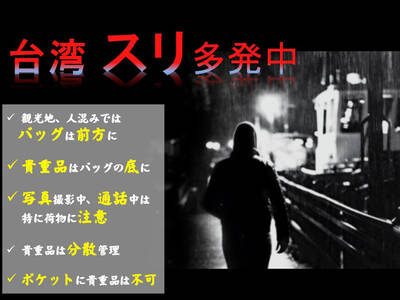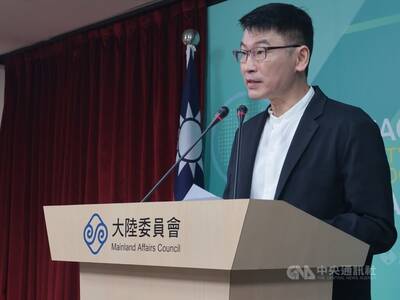The Democratic Progressive Party (DPP) legislative caucus yesterday vowed to put amendments to the election code to increase punishments for vote-buying to a vote on Tuesday if party caucuses fail to see eye to eye on the bill.
Tuesday is the last plenary legislative session held to discuss bills -- rather than questioning the premier and government officials -- before the Dec. 3 local government elections.
With the elections approaching, the DPP legislative caucus yesterday called on the pan-blue camp parties to support amendments to the Public Officials Election and Recall Law (公職人員選舉罷免法).
Although the Procedure Committee placed it on Tuesday's legislative agenda, the DPP caucus fears there will not be enough time to address the bill and hopes to push forward its discussion.
DPP caucus whip Jao Yung-ching (
However, the Chinese Nationalist Party (KMT) caucus' representatives, Legislator Tseng Yung-chuan (曾永權) and KMT caucus whip Pan Wei-kang (潘維剛), later went back on their promise and crossed out their signatures when the bill was scheduled to pass the second reading on Nov. 8.
According to Jao, who also signed the accord, the caucus representatives had agreed at the inter-party negotiation to increase the maximum prison sentence for candidates convicted of vote-buying from five years to 10 years, and the maximum fine from NT$4 million (US$118,900) to NT$10 million.
They also agreed to add a new clause to immediately suspend a candidate from office who is convicted of vote-buying and sentenced to imprisonment without pardon, as well as an article to impose a maximum sentence of two years in jail on civil servants who intend to pay other candidates to drop out of a race.
Only tougher legislation can more effectively deter vote-buying practices, another DPP caucus leader, William Lai (賴清德), said.
Lai added that if the amendments fail to clear the legislature on Tuesday, it is bound to have a negative impact on next month's election.
Lai said that the KMT had adopted a two-handed strategy on the issue, in which they visited district prosecutor's offices to showcase their resolve to combat vote-buying, while at the same time obstructing the passage of the Public Officials Election and Recall Law.
Jao and Lai later visited the KMT caucus with the hope of soliciting the support of its caucus leaders, but none were available to receive them.
The pair then went to see Legislative Speaker Wang Jin-pyng (
Wang pledged to call a cross-party meeting tomorrow in a bid to iron out differences and, hopefully, reach a consensus before Tuesday.

The Japan-Taiwan Exchange Association has cautioned Japanese travelers to be vigilant against pickpockets at several popular tourist spots in Taiwan, including Taipei’s night markets, the Yongkang Street area, Zhongshan MRT Station, and Jiufen (九份) in New Taipei City. The advisory, titled “Recent Development of Concerns,” was posted on the association’s Web site under its safety and emergency report section. It urges travelers to keep backpacks fully zipped and carried in front, with valuables placed at the bottom of the bag. Visitors are advised to be especially mindful of their belongings when taking photos or speaking on the phone, avoid storing wallets and

ENDORSING TAIWAN: Honduran presidential candidate Nasry Afura said that Honduras was ‘100 times better off’ when it was allied with Taipei The Ministry of Foreign Affairs yesterday said it would explore the possibility of restoring diplomatic relations with Honduras based on the principle of maintaining national interests and dignity. The ministry made the remarks in response to reporters’ questions regarding an article titled: “Will Taiwan Regain a Diplomatic Ally?” published in The Diplomat on Saturday. The article said Honduras’ presidential election in November could offer Taiwan the chance to regain an ally, as multiple candidates have promoted re-establishing diplomatic relations with Taiwan. Honduras severed diplomatic ties with Taiwan in March 2023 in favor of Beijing, but since switching its diplomatic recognition,

Scoot announced yesterday that starting in October, it would increase flights between Taipei and Japan’s Narita airport and Hokkaido, and between Singapore and Taipei. The low-cost airline, a subsidiary of Singapore Airlines, also said it would launch flights to Chiang Rai in Thailand, Okinawa and Tokyo’s Haneda airport between December and March next year. Flights between Singapore and Chiang Rai would begin on Jan. 1, with five flights per week operated by an Embraer E190-E2 aircraft, Scoot said. Flights between Singapore and Okinawa would begin on Dec. 15, with three flights per week operated by Airbus A320 aircraft, the airline said. Services between Singapore

The Mainland Affairs Council (MAC) yesterday announced a ban on all current and former government officials from traveling to China to attend a military parade on Sept. 3, which Beijing is to hold to mark the 80th anniversary of the end of the Second Sino-Japanese War. "This year marks the 80th anniversary of the end of World War II and the Republic of China’s victory in the War of Resistance [Against Japan]," MAC Deputy Minister and spokesperson Liang Wen-chieh (梁文傑) told a regular news briefing in Taipei. To prevent Beijing from using the Sept. 3 military parade and related events for "united